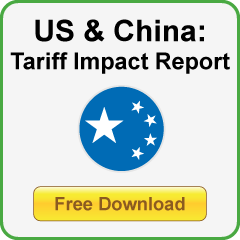Tariff Tracker: US-China Automobile Tariffs Causing Global Trouble
by Sarah Schmidt
September 12, 2018
In May 2018, China announced its intention to cut tariffs on vehicle imports from 25% to 15% beginning July 1, 2018, in reaction to Trump’s complaints of a trade imbalance.
But, driven by the ongoing trade dispute between Washington and Beijing, China also chose to apply a new, additional 25% surtax on US-made vehicles beginning in July 2018, with the result that US-made vehicles imported to China now face a total 40% duty.
From Sea to Shining Sea & Beyond
The retaliatory tariffs impact automakers headquartered around the world, including leading vehicle exporters such as:
- BMW
- Daimler
- Ford
- Tesla
However, the advantage falls to European competitors, such as Audi, that only export cars built in Europe to China because these companies can take advantage of the lower 15% tariff rate.
Other European automakers find themselves doubly impacted by the US’ self-imposed trade war. On the one hand, these suppliers see their competitiveness in the US market undercut by US tariffs on vehicles imported from the EU. On the other hand, firms such as BMW and Daimler have both invested in US-based automotive production sites in recent years, and those facilities export vehicles to China. Cars manufactured in the US for export will be negatively impacted by Chinese tariffs on US-made cars.
Made in the USA? Not Anymore…
Larger US companies such as Ford and GM tie production in the US closely to local demand and export a lesser number of vehicles to China, so these two companies will be less impacted by the retaliatory tariffs than other manufacturers. In fact, both Ford and GM already maintain production capacity in China, and the two firms are likely to increase their investment in the country in order to avoid the sting of the most recent round of retaliatory tariffs.
While higher-value and luxury cars will be less impacted due to greater price elasticity among the wealthy, Tesla has already had to pass along price increases to the Chinese consumer. In addition, Tesla is pursuing the idea of opening a third gigafactory, this time in China, in an effort to circumvent the effects of the trade war. However, the effectiveness of this strategy depends on the longevity of the trade dispute since the factory isn’t expected to be online before 2021.
The cumulative effect of the various automotive-related tariffs will be a shift away from US-based automotive manufacturing by both domestic and foreign multinational firms, with the US’ steel and aluminum tariffs raising the costs of domestic production and Chinese tariffs on vehicles imported from the US reducing the competitiveness of these vehicles in the large Chinese market.
To Learn More
Interested in a deeper dive into tariffs and the industries they'll impact the most? Check out the Freedonia Group's new white paper for the latest insights from experts.
Have unique research needs?
Freedonia Custom Research listens intently to your needs and objectives. Then we work diligently to define and deliver a service to meet them.Subscribe to Our Blog
Stay up to date with the latest information about new market research and news in areas relevant to your business from our analysts and team members.Freedonia Group Blog Subscription
Provide the following details to subscribe.
